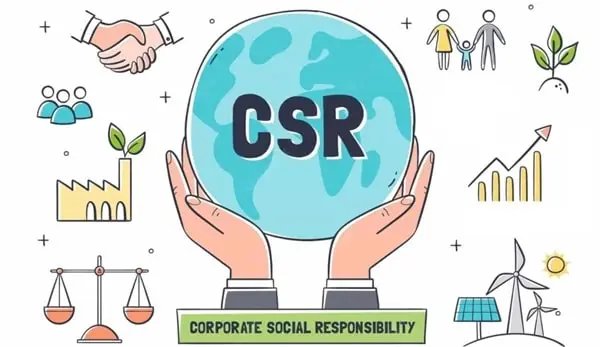If you are into company analytics, or it could be that you are an investor, and that’s why the whole Corporate Social Responsibility aka CSR thing is super important for you to look at before you invest your money into a company, right? Or it could be that you are just a regular person trying to find the companies that are involved in CSR activities, right? But before that, you must be clear in your head about what it means and what are the good or bad sides of this CSR thing. That’s the very reason why we are here to look at the possible advantages and disadvantages of corporate social responsibility. Alright, here we go now.
Advantages of Corporate Social Responsibility (CSR)

1. Boosting Brand Recognition and Customer Loyalty
When a company actively engages in socially and environmentally beneficial initiatives, that not only benefits society or the environment but also raises its own brand image. Such an improved brand image results in more appreciation from customers, they are more likely to deal with brands that show commitment to society and the environment. Customers have a positive impression of such brands, which in turn means sustained business growth.
2. Elevating Employee Satisfaction and Retention
CSR activity has a major impact on the satisfaction and retention rates of employees too, you know? When employees can see that their company is doing something for the community, in this environment of compassion, they will find deep feelings toward staff cooperation, which ultimately creates harmony. In addition, CSR events also provide staff with opportunities to participate directly in community projects, thereby creating a charitable spirit throughout the enterprise.
3. Attracting Investors and Improving Financial Performance
You know, today’s investors are increasingly looking for investment options that are sustainable and offer long-term growth prospects. By showing staunch commitment to CSR and insisting on ethical standards, companies are seen as more responsible and less high-risk, attracting investment from mutual funds and individuals who attach great importance to moral rectitude in business practices.
4. Making a Positive Contribution to Society and the Environment
CSR essentially means giving something back to society as well as environmental protection, right? By tackling social concerns like education, health, or climate protection, companies can make a huge difference in living standards in whole neighborhoods. Such contributions mitigate some of the most pressing issues facing society while at the same time helping promote development that is sustainable environmentally over the longer term.
5. Ensure Compliance with Government Regulations
CSR in India also plays an important role in compliance with local laws and regulations related to social and environmental standards. By proactively engaging in CSR activities, no matter what, companies can navigate the regulatory environment more effectively and avoid potential legal headaches and fines. Compliance with CSR legislation not only underscores a company’s commitment to lawful business practices, it also enhances its reputation with regulators and the public–consolidating more firmly its position as a responsible and ethical business entity.
Disadvantages of Corporate Social Responsibility (CSR)
1. The Financial Burden
Actually, starting a CSR project usually means expenses. For SMEs, in particular, these costs can be substantial due to their high operating expenses. Money has to come from somewhere to pay for community projects and environmental activities while also building the facilities to support them, right? In the final analysis, a company with limited resources may find it difficult to overcome this fixed charge on its budget, and that’s a really big issue right there.
2. The Risk of Greenwash
But CSR in India faces a key problem also: greenwashing. Companies say they are working on CSR building activities as a public relations technique rather than out of a genuine concern for social or environmental issues. As a result, consumers and stakeholders can become cynical, and more to the point, all of this not only damages the reputation of individual firms involved in such activities, it also dilutes the overall effect CSR efforts have achieved across their real targets. Eventually, this will mean that it gets harder and harder for who knows whether others might see what you’re doing as sincere or fake.
3. Conflict between Business and Social Responsibility
One problem is that the pursuit of financial gain and social responsibilities may conflict, you know? Companies sometimes encounter difficulties when aligning their CSR actions with core business requirements. Should the enterprise push throughout this resultant contradiction to maximize profitability at the expense of social welfare, or does it instead seek a balance and thus help society? That’s a tricky one, to be honest.
4. More Complex Management
The CSR adds to the administrative structure of a company, for sure, and coordinating this series of campaigns requires resources of its own, strategic planning at all levels, and constant monitoring to guarantee effectiveness and consistency with overall business goals. This complex management poses a challenge for companies adept at streamlining operations because it drains both manpower and finance from their core business activities.
5. Ethical Dilemmas
At the end of the day, companies may too face ethical dilemmas in the choice and maintenance of CSR projects. Blending in with corporate culture and satisfying the needs of society by earning their trust is not easy to achieve. By carefully handling such ethical considerations, companies are able to avoid accusations that they are insincere or opportunistic. Formulating clearly defined criteria for ethics and maintaining open dialogue with all interested parties are steps that must be taken in order to tackle these embarrassing problems and conserve the integrity of CSR activities.
Conclusion
That’s all! Now, you precisely know why so many big corporations, businesses, and companies are involved in CSR. On top of that, you also know the behind-the-scenes now, like why and how many companies are just doing this CSR thing for the sake of it only. Right?

Meet Suhas Harshe, a financial advisor committed to assisting people and businesses in confidently understanding and managing the complexities of the financial world. Suhas has shared his knowledge on various topics like business, investment strategies, optimizing taxes, and promoting financial well-being through articles in InvestmentDose.com


